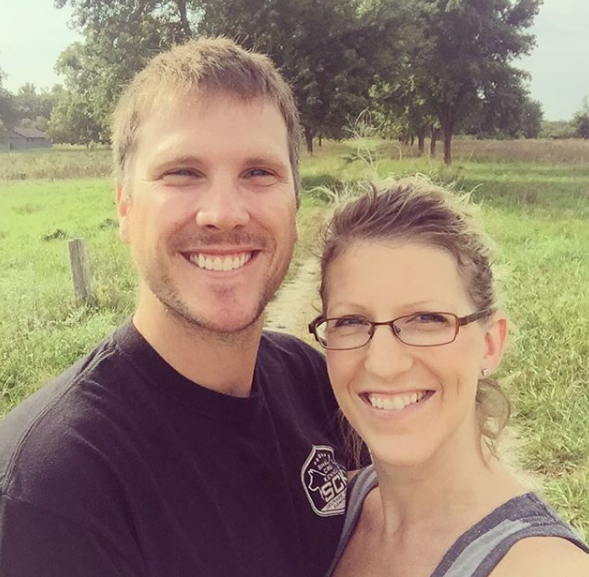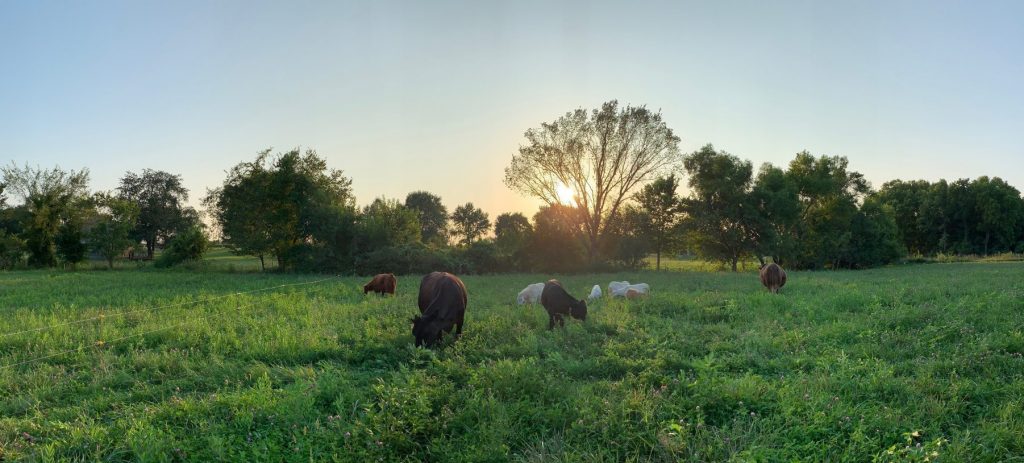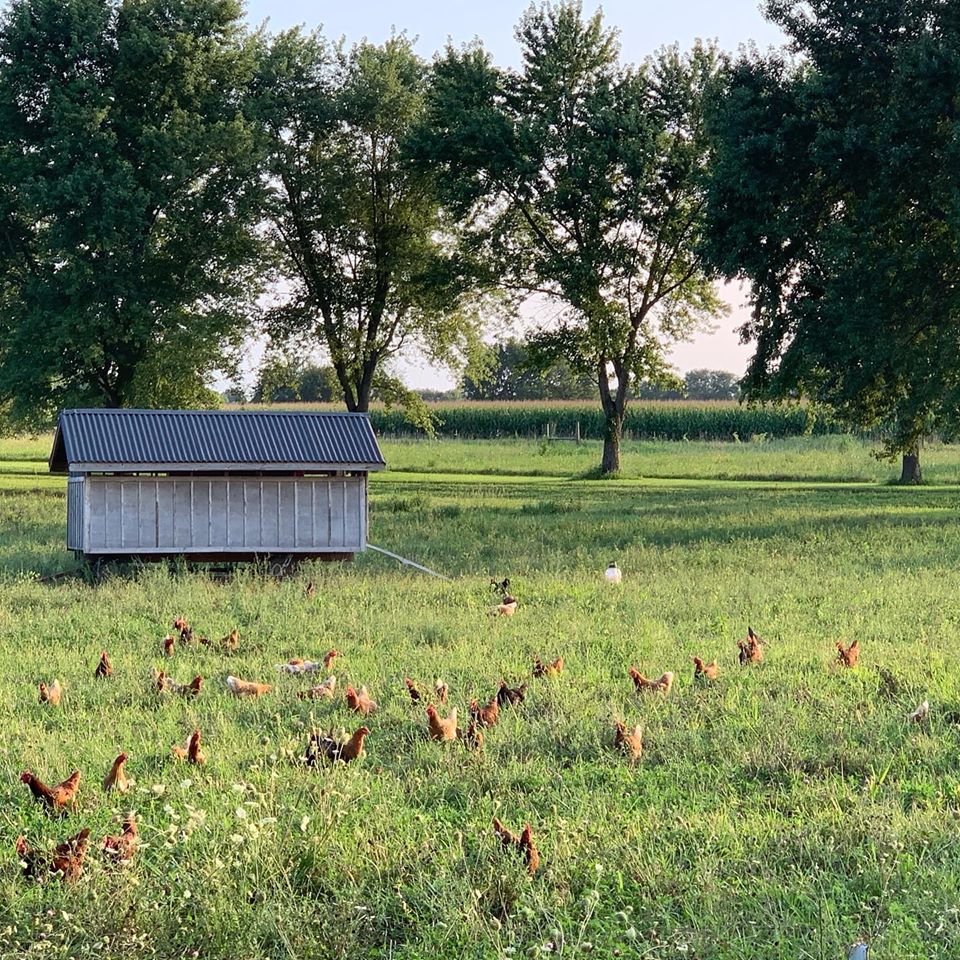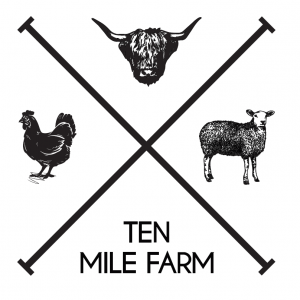History of Ten Mile Farm
Our story as first generation farmers is likely different than most. While childhood had us both growing up in the middle of farming country in north central Iowa neither of us actually lived on a farm. Nick had spent some time on his grandparent’s row crop farm and even worked some during high school at an industrial pig farm, but was never fully immersed in the farming lifestyle. After college, a move to the Kansas City area came calling and we spent the first ten years of married life living in the city working in the public safety and auditing worlds. But three kids later and we found ourselves yearning for gravel roads, country skies and some land of our own. Our search began and ultimately led us to our twelve acre parcel south of Spring Hill, Kansas along the banks of Ten Mile Creek.

Nick and Jenny on the first day at Ten Mile Farm in 2015.
During our land search we also stumbled across the great American farming icon, Joel Salatin. Joel’s perspective and the techniques he implemented at his farm (Polyface Farm) were in such stark contrast to our notion of conventional agriculture. It made farming seem not only deceptively simple but entirely possible, and to this day still guides the core principles on which our farm operates. There have been others too that have added to the vision we have for our farm – people like Dr. Allen Williams (Joyce Farms), Greg Judy (Green Pastures Farm), Colin Seis (Winona), Allan Savory, and Will Harris (White Oak Pastures) to name just a few. All these farming legends have influenced us in such an impactful way and helped to develop the foundation of our farming philosophy.
Our Farming Philosophy
Soil Health
Our approach to farming is focused on the health of the soil. Healthy soil produces an abundance of diverse and nutrient dense forage. High quality forage provides nourishment for livestock and makes them vibrant and healthy–eliminating the need to subject them to growth hormones, vaccines, antibiotics, and chemical wormers. We also refuse to apply any synthetic fertilizers, pesticides, fungicides, or herbicides on our pastures. All these products destroy life below the soil. Nature has an answer for all problems encountered on the farm. It is our job to find that solution through proper management and observation.
Diversity
We try and model everything on our farm after what’s found in nature–with the key component being diversity. As Will Harris from White Oak Pastures loves to point out, “Nature abhors a monoculture.” No where in nature do you find one type of something. It always has a diversity of species in plants, insects, birds, mammals, reptiles, and amphibians. The same is true with the life that is found below the soil–bacteria, fungi, algae, protozoa, mites, nematodes, and earthworms to name a few. All working together in concert but each having their own specific role to play in the great circle of life. And so we too at Ten Mile Farm utilize a diverse group of livestock, working in concert, that are aimed at regenerating the life below the soil. All the pastures we own and rent have this core principle guiding our entire grazing plan.
Adaptability
Because nature is constantly changing we too have to remain flexible. We have to be ready to adjust to all of the changing weather patterns, soil conditions, forage quality, and any animal health conditions in our livestock. Nothing is the same on the farm. There is no recipe or formula that works the same way for every animal or every pasture. The success or failure of our rehabilitative efforts depends on our observational prowess and ability to adapt.
Application
So what does all this look like in a real world application? We hope you are able to find time to come out and tour the farm to see it all the moving parts together, but for those that are not able here is how we try to make it happen.
We have specifically chosen the animals we have due in part to our personal context and interests but also because of the specific roles they play in nature.
As nature’s pruners the cows and sheep are designed to eat grasses, legumes, and forbs. They are grouped together for protection and moved constantly throughout the year. They compliment our pastures so well because of their nutrient rich manure (fertilizer) and because their grazing habits increase the diversity of the plant-life. Cows and sheep eat different types of forage which stimulates greater plant variety. The animals are then able to have a broader range of plants to meet their dietary needs. The animals are never confined to a feedlot and only consume a diet they were designed to eat.

Flerd in Action
The chickens follow behind the ruminants and act as nature’s sanitizers. They help distribute all the manure generated by our flerd (herd of cows + flock of sheep) and also help to control fly problems often associated with cattle. As true omnivores you’ll find our chickens eating many types of insects, worms, and even the occasional mouse or frog. They also leave behind a nitrogen-rich manure fertilizer that helps feed the microorganisms below the soil.

Chickens sanitizing pasture
Our pigs (and small herd of goats) help clear out overgrown areas in the pasture, wooded areas, and along our creek beds. Both species thrive in those environments and help to increase sunlight access. More sunlight leads to more forage and better soil/animal health. What is the byproduct for all the pig’s hardwork on the farm? BACON!
All the animals are moved frequently which helps to eliminate internal parasite problems. Intestinal parasites (worms) can stunt animal growth and performance, decrease fertility, and in some cases can even cause death if left untreated. Parasite issues are also kept in check because of our diversity of animals. Most internal parasites only affect a specific species of animal. A cow parasite ingested by one of our pigs or sheep will end that organisms life cycle. The same is true for a cow ingesting a pig or sheep parasite. When we have little to no internal parasite problems we can expect greater animal performance and a healthier product for our customers.
Occasionally an animal becomes sick or needs treatment for an ailment. These events are rare, but we do not embrace the broad spectrum administration of antibiotics. Because of our firm commitment to animal welfare and good husbandry practices we will administer medication on a case-by-case basis, and only to the particular animal(s) that need it.
Our Customer Commitment
- As your local farmer we are committed to providing your family with clean and nutrient dense pastured meat at a fair price–both for you and for our farm.
- We are committed to providing you access to our farm so that you can see first hand how your food is grown. We want our customers to be confident in their purchases and know the value they are getting by choosing Ten Mile Farm
- We are committed to providing our customers with a superior shopping experience. This is accomplished by offering convenient drop locations in the city, routine delivery dates, and flexible payment options for larger bulk orders.
- We are committed to providing education on many types of farm-related and cultural topics including nutritional articles, butchering instructions, cooking techniques, recipe options, on-farm social events, and philanthropic opportunities.
- Lastly, we are committed to partnering together with you to improve the environment and make it better for future generations. By choosing to support our farm you are also choosing to support the regenerative and healing effects our farming practices have on the land.


